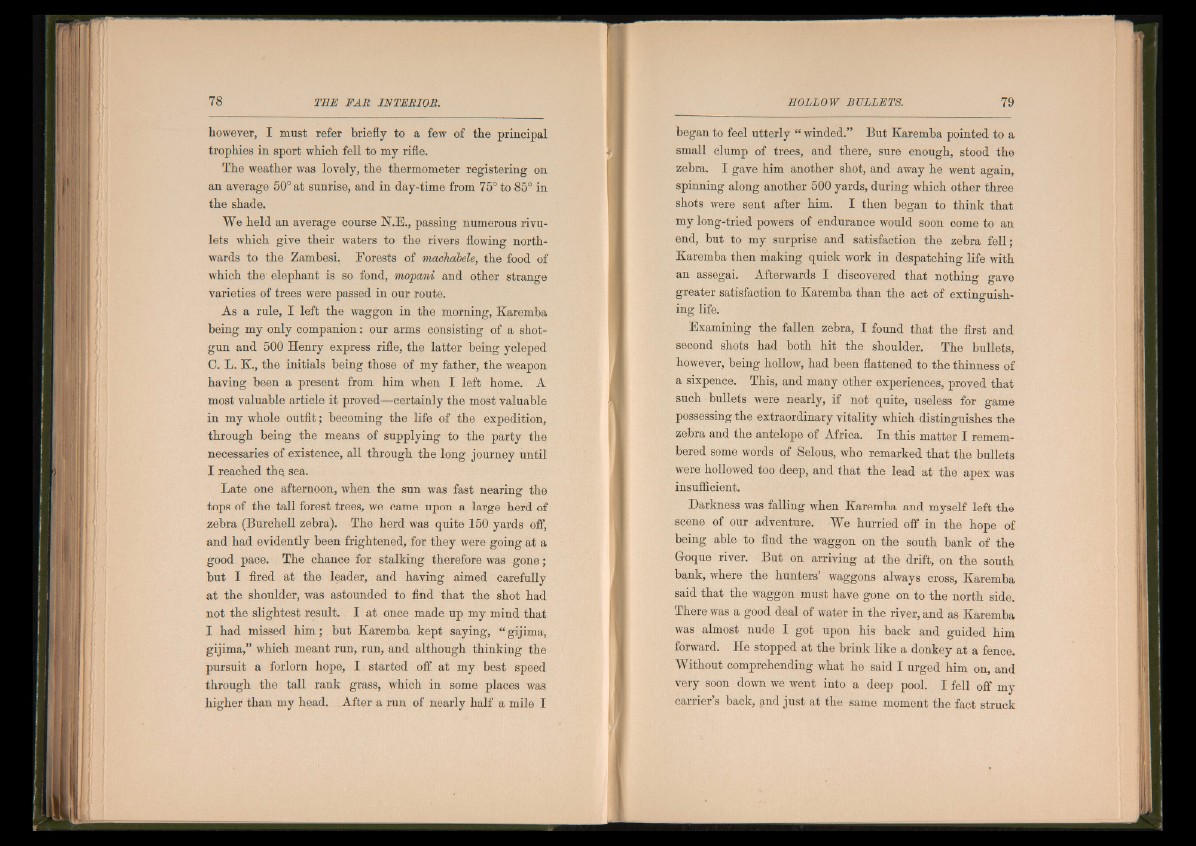
however, I must refer briefly to a few of the principal
trophies in sport which fell to my rifle.
The weather was lovely, the thermometer registering on
an average 50° at sunrise, and in day-time from 75° to 85° in
the shade.
We held an average course N.E., passing numerous rivulets
which give their waters to the rivers flowing northwards
to the Zambesi. Forests of machabele, the food of
which the elephant is so fond, mopani and other strange
varieties of trees were passed in our route.
As a rule, I left the waggon in the morning, Karemba
being my only companion: our arms consisting of a shotgun
and 500 Henry express rifle, the latter being ycleped
0. L. K., the initials being those of my father, the weapon
having been a present from him when I left home. A
most valuable article it proved—certainly the most valuable
in my whole outfit; becoming the life of the expedition,
through being the means of supplying to the party the
necessaries of existence, all through the long journey until
I reached the sea.
Late one afternoon, when the sun was fast nearing the
tops of the tall forest trees, we came upon a large herd of
zebra (Burchell zebra). The herd was quite 150 yards off,
and had evidently been frightened, for they were going at a
good pace. The chance for stalking therefore was gone;
but I fired at the leader, and having aimed carefully
at the shoulder, was astounded to find that the shot had
not the slightest result. I at once made up my mind that
I had missed h im ; but Karemba kept saying, “ gijima,
gijima,” which meant run, run, and although thinking the
pursuit a forlorn hope, I started off at my best speed
through the tall rank grass, which in some places was
higher than my head. After a run of nearly half a mile I
began to feel utterly “ winded.” But Karemba pointed to a
small clump of trees, and there, sure enough, stood the
zebra. I gave him another shot, and away he went again,
spinning along another 500 yards, during which other three
shots were sent after him. I then began to think that
my long-tried powers of endurance would soon come to an
end, but to my surprise and satisfaction the zebra fell;
Karemba then making quick work in despatching life with
an assegai. Afterwards I discovered that nothing gave
greater satisfaction to Karemba than the act of extinguishing
life.
Examining the fallen zebra, I found that the first and
second shots had both hit the shoulder. The bullets,
however, being hollow, had been flattened to the thinness of
a sixpence. This, and many other experiences, proved that
such bullets were nearly, if not quite, useless for game
possessing the extraordinary vitality which distinguishes the
zebra and the antelope of Africa. In this matter I remembered
some words of Selous, who remarked that the bullets
were hollowed too deep, and that the lead at the apex was
insufficient.
Darkness was falling when Karemba and myself left the
scene of our adventure. We hurried off in the hope of
being able to find the waggon on the south bank of the
Goque river. But on arriving at the drift, on the south
bank, where the hunters’ waggons always cross, Karemba
said that the waggon must have gone on to the north side.
There was a good deal of water in the river, and as Karemba
was almost nude I got upon his back and guided him
forward. He stopped at the brink like a donkey at a fence.
Without comprehending what he said I urged him on, and
very soon down we went into a deep pool. I fell off my
carrier’s back, and just at the same moment the fact struck